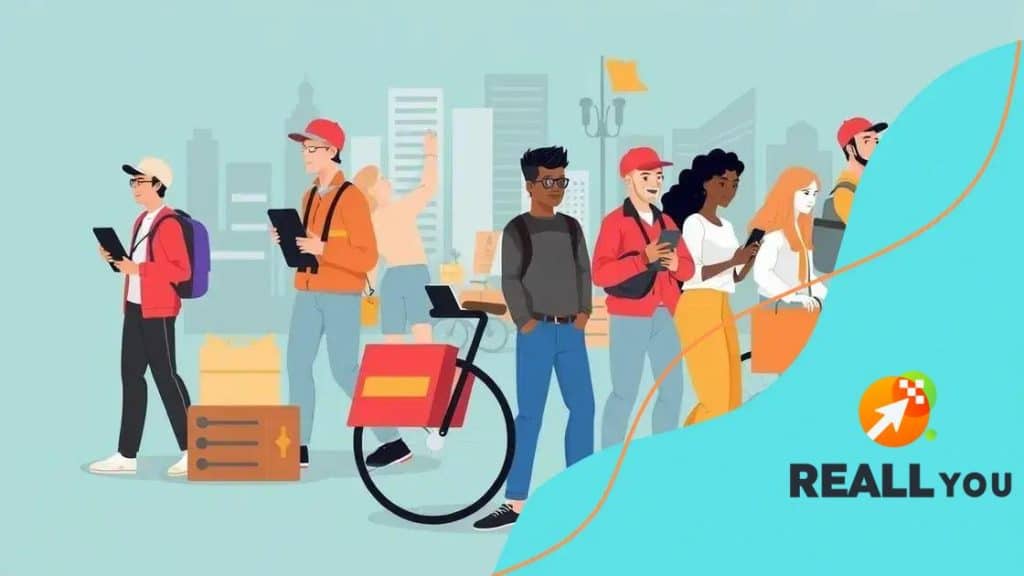How the gig economy is transforming labor laws in 2025

Anúncios
The gig economy is transforming labor laws by increasing worker rights, requiring businesses to adapt to new regulations while providing flexibility and opportunities for millions of freelance workers.
How the gig economy is transforming labor laws in 2025 is a conversation that’s increasingly relevant. With shifts in how we work, it raises important questions about rights and regulations. Are you aware of how these changes might affect you?
Anúncios
Understanding the gig economy’s rise
As we explore the rise of the gig economy, it’s clear that this trend is reshaping the way we think about work. More people are opting for freelance opportunities, allowing for greater flexibility in their schedules and work locations.
Anúncios
What is the gig economy?
The gig economy consists of short-term, flexible jobs often mediated by online platforms. This model allows workers to take on projects that suit their skills and interests. Many find that gig work offers a better work-life balance compared to traditional 9-to-5 jobs.
Key features of gig work
- Flexibility: Gig workers can choose when and where they work.
- Diversity: The types of gigs available can range from ride-sharing to graphic design.
- Independence: Workers often have control over their workload and income.
- Technology-driven: Most gigs are accessed through apps or websites.
One major factor contributing to the growth of the gig economy is technological advancement. As more people gain access to the internet, online platforms can connect employers with a vast pool of talent. This accessibility benefits both workers and businesses. Workers can showcase their skills globally, and companies can find the right talent quickly.
Moreover, the desire for autonomy drives many individuals toward gig work. Many prefer the idea of being their own boss, leading to an increase in entrepreneurship within the gig economy. As workers see the benefits of such a lifestyle, the traditional job market faces new challenges.
Key changes in labor laws
As the gig economy grows, there have been key changes in labor laws to adapt to this new working landscape. These changes aim to protect gig workers while balancing the needs of businesses. It’s essential to understand how these laws are evolving and what they mean for both sides.
New classifications of workers
One significant change is the introduction of new classifications for workers. Many governments are now recognizing gig workers as a distinct category. This means they are entitled to certain benefits, which include minimum wage protections and sometimes even health care.
Benefits and protections
- Minimum wage laws: Many regions are implementing minimum wage laws specifically for gig workers.
- Health benefits: Some areas are requiring companies to offer healthcare options to gig workers.
- Unemployment insurance: New provisions may allow gig workers to access unemployment benefits during downtimes.
- Worker rights: Laws are being refined to secure worker rights, ensuring fair treatment in hiring practices.
These changes reflect a growing recognition of the importance of gigs in the economy. While companies benefit from flexible labor, it’s vital that the rights of workers are not overlooked. As more individuals rely on gig work for their income, the demand for fair labor practices intensifies.
For businesses, adapting to these labor laws can be challenging. Compliance often requires changes in how they classify and manage their workforce. Companies must also ensure they are prepared to provide the necessary benefits. This transition will take time, but it is essential for the sustainability of the gig economy.
Impact on worker rights

The impact on worker rights in the gig economy has become a significant focus as more people engage in gig work. With this shift, there is a growing concern about ensuring that workers are treated fairly and justly. Advocates emphasize the importance of extending traditional labor rights to gig workers who may lack essential protections.
Rights and protections
One of the crucial issues is whether gig workers should be classified as employees or independent contractors. Classifying gig workers as employees means they receive more benefits and protections, such as:
- Minimum wage: Ensuring that workers earn a living wage for their labor.
- Health insurance: Access to affordable healthcare options is critical for gig workers who often lack this support.
- Overtime pay: Workers should be compensated fairly for extra hours.
- Paid leave: Sick days and parental leave are important for work-life balance.
Moreover, as new labor laws are introduced, businesses must adapt to provide these rights. Some companies are beginning to follow these changes to stay competitive and retain talent. Workers are increasingly demanding accountability and fairness. This has led to a push for more regulations to safeguard their rights.
Awareness of worker rights is also growing among gig workers. Many now seek to organize and advocate for better treatment. They recognize that collective action can lead to significant changes in policies. The combination of technology and worker organization is challenging the traditional norms seen in employment.
Challenges for businesses
Businesses face numerous challenges as they adapt to the changing landscape of the gig economy. These challenges often revolve around complying with new labor laws while maintaining profitability. Companies need to navigate a complex environment where the rights of gig workers are a priority.
Compliance with regulations
One major challenge for businesses is ensuring compliance with evolving regulations. As local and national governments introduce new laws, companies must stay updated. Failure to comply can lead to penalties and damage to their reputation.
Costs associated with new benefits
- Healthcare costs: Providing health benefits to gig workers may increase overhead for businesses.
- Training requirements: Companies may need to invest in training programs to ensure workers understand their rights and roles.
- Administrative burdens: Following new regulations requires additional administrative work and resources.
- Potential lawsuits: Non-compliance can result in legal action from workers or government bodies.
The transition to new labor formats often leads to operational disruptions. Companies might struggle to implement the changes quickly and effectively. This can create a backlash from workers who expect immediate improvements in their working conditions.
Moreover, the gig economy can make workforce planning challenging. Businesses face fluctuating demand, making it difficult to manage labor resources. They must balance the need for flexibility with the necessity of maintaining efficiency.
Future trends in gig work
As we look ahead, several future trends in gig work are emerging. These trends indicate how the gig economy will evolve and influence both workers and businesses. Understanding these trends can help stakeholders navigate the changing landscape.
Technological advancements
Technology will continue to drive the growth of the gig economy. More apps and platforms are being developed, providing easier access for both workers and employers. Machine learning and AI are enhancing these platforms, making job matching more efficient.
Shift towards remote work
The pandemic accelerated the acceptance of remote work across many sectors. Gig workers will increasingly find opportunities that allow them to work from anywhere. This shift enables individuals to provide services globally, expanding their market reach. The flexibility of working remotely can improve job satisfaction.
Focus on worker rights
- Increasing regulations: We can expect more governments to introduce laws protecting gig workers.
- Support networks: Workers may form unions or organizations to advocate for their rights.
- Demand for benefits: Pressure on companies to provide benefits will continue to rise.
- Greater awareness: Workers will be more informed about their rights and seek better working conditions.
Additionally, as the gig economy matures, businesses will adapt their models to accommodate worker needs. This may lead to hybrid employment structures that blend gig work with traditional employment benefits. Employers who embrace these changes will enhance their appeal in a competitive labor market.
Overall, the future of gig work seems promising but will require ongoing adjustments by both workers and businesses. As interactions between workers and employers evolve, the gig economy will reshape the world of work.
FAQ – Frequently Asked Questions about the Gig Economy
What are the main benefits of gig work?
Gig work offers flexibility and control over one’s schedule, allowing individuals to balance work with personal life more easily.
How are worker rights changing in the gig economy?
There is a growing recognition of gig workers’ rights, with new regulations emerging to ensure fair treatment and benefits.
What challenges do businesses face in the gig economy?
Businesses must navigate compliance with new labor laws, manage costs associated with benefits, and adapt to workforce fluctuations.
What trends can we expect in the future of gig work?
Future trends include increased reliance on technology for job matching, a shift toward remote work, and a greater focus on worker rights.







